- Home
- Anson Cameron
Stealing Picasso Page 8
Stealing Picasso Read online
Page 8
Mireille doesn’t even compare the paintings, because she has watched the new one grow. ‘And done like you said. The identical twin. I have lost our bet.’
Having known for days that he was going to win the bet and that he was going to have Mireille for a night, he’d studied his nude self in a full-length mirror that morning, trying to see what she would see. He flexed a quadricep and sighed at the result, flexed a bicep and blinked three times at its deficiency. He thrust his hips forwards and closed one eye for perspective, and made a frame of his thumbs and forefingers. Looking through it he saw himself, almost hairless, his muscles withered, gone, leaving the skin hanging in flaccid pouches. His penis angling pale and knotted from his wizened torso. He could not, in all conscience, present this to a woman of Mireille’s beauty.
‘Our bet?’ he asks now, feigning ignorance. ‘Our bet? Oh, that. Forget that. I knew I could replicate the painting. There was no bet.’ Releasing Mireille from the debt of sleeping with his despicable self, Turton feels like a man who has rescued a princess from the libidinous attentions of a gibbon. He feels heroic. Stands tall. Probably, he thinks to himself, this flush of chivalry is a better pay-off than I could have got by having sex with her. He wonders, briefly, if this means he is in love with her.
Mireille kisses him. Harry is relieved and pats Turton’s back and hugs him and tells him he didn’t think he could do it, but, gee, he surely did do it. I … dentical. They drink Armagnac in the dark of the gallery, admiring Turton’s Weeping Woman. As they lie there Turton massages Mireille’s feet, the loser’s task, her head in Harry’s lap.
But before long Turton’s mood darkens. He is beginning to regard his own Weeping Woman suspiciously. Staring from her to Mireille, he begins to massage Mireille’s feet more and more violently, until she yelps, ‘Ow, too hard. I am not a bear.’ She pulls them from him.
‘Why would you make a bet like that? Risk having to sleep with a dirty old man?’
‘You are not so old or so dirty.’
‘Oh, I am. A decrepit thing. Why? Why did you want me to paint her?’ He reaches out for her feet again and puts them in his lap. ‘If we stole the original and left mine in its place, I wonder how long it would be before anyone noticed.’ He closes his eyes and holds her feet gently in his cupped hands, using them as a seismograph to feel for the telltale vibrations of her guilt. Did she flinch when he said the word ‘stole’?
‘It’d probably be quite a while, wouldn’t it?’ he asks. ‘Time enough to sell the real painting and get away.’ He is fishing now. Why did she want this new painting?
She sits up, folding her feet beneath her. ‘Your reasoning is faulty, Turton. What is the point of stealing a painting if no one knew it was gone? People who buy stolen art must know it stolen before they can buy it. It must announce its availability on the black market in a great scandale of front pages and TV newsflashes and detectives making big statements and politicians harrumphing.’
‘I won’t do it,’ he tells Mireille. ‘Don’t even ask me.’ He lets her feet go and takes hold of his sideboards. ‘Don’t even tell me.’
She reaches out and unlocks his fingers from his sideboards and puts his hands in her lap. ‘Ask yourself what Picasso would have done,’ she whispers, kissing him on the lips, pulling his body against hers.
She doesn’t wink at Harry. It would have been better if she had, but Harry knows she wants to. And he is consoled by being sure that Mireille and he are in this together. She is a siren calling a sucker onto the rocks. A woman taking hold of a man’s workaday sanity and his proudly held morality and crushing them between her thighs as if she were a vice. It excites Harry that Turton is being gathered up and crushed in the vice of her allure. He feels complicit in the sting. His woman is doing this and he can trust her to do it: take another man’s penis in her mouth and not get into it; never, during the entire process have a thought or flicker of lust, because he, Harry, is so strongly the centrepiece of her desire. He isn’t worried at the thought of Mireille’s sexual predilections being discovered by Turton. He is confident she won’t betray them. She will serve Turton up a Punch & Judy show of her own needs.
Still, the sounds of lovemaking, the groans, hyperventilations and whimpers (despite Harry knowing them a crumb-trail of language to lead Turton falsely to a conclusion of his own sexual magnificence) are terrible to hear. Harry feels sick and wanders away humming ‘Advance Australia Fair’ loudly enough to drown out Mireille’s sounds. He meanders through neo-Byzantine ceramics and into the cul-de-sac of post-modernism, leaving Modigliani’s portrait of Manuel Humbert (that straitlaced virgin, with his startled vicar’s eyes and high white collar) to eavesdrop the purple gratitude voiced by Turton Pym as he lays his hands on Mireille. ‘Oh … Oh, yes, indeed … thank you … Yes.’
The grace bestowed on the pathetic and deluded is that they don’t realise they are pathetic and deluded.
Turton Pym is watching himself in a mirror held in his left hand. His aged face is framed by his lush Wagnerian side levers. In his right hand he is holding a brush. He is painting himself for another attempt at another Archibald Prize. He is not a famous Australian, as the rules of the competition dictate the subject of any portrait must be. But if he is caught stealing the Weeping Woman he will be famous. So he is imbuing his face with a compassion and wisdom that will explain to the world his honorable intentions in that theft. He is painting this portrait so it will live after him, as long as the crime itself, refuting all the scuttlebutt and slander his detractors might bestow on him.
Because if some suspect a vengeful motive in what he is doing, if some suspect a case of sour grapes, they are wrong, Turton tells himself. Though it is undeniable he has not been recognised as he should have been; undeniable that for decades he has been one of Australia’s most talented artists, but is nowhere known. Does he command his own shows in state galleries? He does not. Is he hung in the very gallery he serves? He is not. If Weston Guest is ruined and made to look a fool by this episode will he, Turton, don mourning rags? He will not. He will, as Eliza Doolittle said, get dressed and go to town. But this theft is not an attempt to destroy those who have hindered his advancement, he reassures himself.
He fears it will be said of him (and he knows the cowards who will say it. And, by God, his ears burn when he imagines such things said), when he is no longer here to denounce and vilify the rumourmongers, that he was an old man suffering under the thrall of a beautiful woman – her firm breasts and her laughing eyes. A sphinx with hips like Ava Gardner, who came from nowhere and restored his manhood. He fears it will be said she put a spell on him and made him do her bidding. That after she lay with him that night beneath the two Weeping Women and made him a man again, he cast himself at her feet and offered himself up as her willing slave. (Slave! Slanderous bastards. Turton Pym has lived his life as a Marxist.)
He was old, they will say. He craved a woman’s touch. The sweet things a woman can whisper were, to him, a tonic. In his decrepit state the flattery and regard of a beautiful woman had become so rare it took on a great power. Thus was he led, they will say. A pig with a ring through his nose, hauled along by sweet nothings and a blow job. A pathetic and deluded character.
Turton tells himself he doesn’t care what they will say. Damn them, anyway – this self-portrait (the furrowed brow, the sage eye) will refute it all.
Which is not to say that something about the woman doesn’t tickle his fancy. To have heard her wail as Turton served it up to her in the Hall of the Great Europeans – loud, loud, loud, baby. Thomas de Keyser’s portrait of Frederick van Velthuysen and his wife, Josina, is hung to the left of the Weeping Woman, and as he screwed Mireille, Turton saw Fred van V. reach out with his lace gloves to block Josina’s ears, lest Mireille’s squeals enlighten the old girl as to what she has been missing out on and she start making demands above and beyond those his gout-knotted body could deliver.
And yes, a man is always pleased, and shocked, to deliver a woma
n such apocalyptic pleasure. It leaves one feeling awed at one’s own voodoo, as it were. Like kicking a football over a silo. It puffs one’s chest. To be honest, it makes one feel terrific. So, Turton admits to himself, her thrashings and weepings were a tonic to a fading man.
But the all-knowing gang of arselickers that run the gallery will also snicker, ‘Oh, she praised his art.’ And they will tut-tut at the unfairness of that. Because we all know that, while old Turton’s art isn’t any bloody good, he is a sucker for a kind word. ‘The shameless woman feigned admiration for his still lifes. How could she?’ It will be generally agreed she bullshitted him royally. But Turton has endured a lifetime of flatterers, and he does not count this woman as one. She looked him in the eye and called him ‘artist’, and she meant it. No, she didn’t con him. He didn’t steal the Weeping Woman for her.
As he paints this noble self-portrait, he asks his noble painted self, why did he steal the painting? And he tells his noble painted self, while adding a point of white intelligence to his pupil, that he did it in the belief that Art had become so tainted by Price that if his small adventure could use the abomination of Price to aid Art, then it was well done and wholly justified. He did it in the steadfast belief that Pablo Picasso, whom he paddled around Barcelona in a canoe in his youth, and who had a soul as large as Quixote, would have done it himself, had he known that his woman’s glory was now measured in dollars and she sat imprisoned and mocked by the public, like Marie Antoinette.
A Christian, when faced with a problem, a choice, an opportunity, will often ask, ‘What would Jesus have done?’ as a simple way of cutting a path through the morality of any dilemma. Let Jesus be your guide. ‘A bank clerk has struck a keyboard one too many times and added a zero to my life savings. What would Jesus have done in my shoes?’
Turton is not a Christian. Before agreeing to cooperate in this heist he did as Mireille suggested and asked himself what Picasso would have done. He closed his eyes and smoked a pipe and asked the great Spaniard. And Picasso came to Turton in a vision, a dream, his eyes alight with enthusiasm for the scheme. It was Picasso himself who stole the Weeping Woman. He took Turton by the hand and pulled him through the green door. He tiptoed into the gallery alongside them, sniggering, hopping foot to foot at the adventure of stealing his own work. Because, for Picasso, stealing a Picasso was a far more exciting way to come by a Picasso than to paint one. He could paint one any time. And don’t forget Picasso believed in stolen art. (He was implicated in the theft of the Mona Lisa from the Louvre in 1911 at a time when her fortunes were flagging. There is nothing like an abduction to furnish stature to a fading beauty’s reputation.) Picasso knew what an abduction would do for his Woman’s fame.
When Harry, Mireille and Turton arrive in the Hall of the Great Europeans, Turton notices Picasso is hopping from foot to foot, grinning impishly, his tongue flicking out, tasting life again; bald, barrel-chested, eyes aflame, as high and coltish as a prisoner on day-release. Which, Turton supposes, he is. Released from the prison of Death for this one excursion.
Straight away Picasso skips up to a Manet, The House at Rueil, and cocks his leg at it like a dog leaking on a tree. The painting does have a tree in the middle of it, but he isn’t pissing on the tree, Turton realises, he is pissing on Manet. Turton hisses a pissing noise as he watches Picasso, smiles to himself when he hears Picasso say to Manet, ‘You boring man. You vector of ennui’, and laughs as he sees Picasso bare his teeth sleepily at the canvas in contempt. One shouldn’t piss on other people’s art. But as a tool for self-aggrandisement it is entirely understandable. The critics know this.
It is rather embarrassing for Turton to see Picasso behaving as a poodle might. There is no need for a man so indisputably great to mark his territory. On the other hand, it is a guilty thrill to see a giant debase icons. I mean … pissing on a Manet. Unthinkable sacrilege, but if you want any more proof of Picasso’s genius, well, there it is. One’s mind must be free of dogma to do such a thing. Alone. Out there in a galaxy of self-regard where genius lives.
Turning, triumphant at having put Manet in his place, Picasso spots a Brueghel across the hall and prances over to it, dropping his strides and brown-eyeing it at point-blank. Harry is shocked – he has a soft spot for Brueghel – and puts his hands to his face, watching through laced fingers while Picasso waggles his arse at those chubby-faced Flemish peasants held spellbound, unable to respond, food halfway to their lips. Mireille is laughing, urging the old rascal on, ‘Oui, oui, monsieur.’
Next he strides up to a naked Caravaggio, St John the Baptist, shucks off his own clothes, takes hold of his wedding tackle and shakes it at St John, denouncing the inferiority of his and Caravaggio’s equipment. ‘With this, I have slain harems. With that bloodless thing,’ he points at St John’s penis, ‘you could not slay a rabbit.’
He then pretends to vomit on a Sickert and shields his eyes from a Vermeer as though it is too hideous to gaze upon. Picasso isn’t entirely happy hanging alongside these also-rans. He curses them under his breath and waves at his Woman as one might at a lover imprisoned in a tower.
Mireille has taken a screwdriver from her pocket. Turton has never seen such a tool before. It has a triangular head that fits the triangular apertures in the security screws holding the Weeping Woman to the wall. Where did she get it? How did she know it was needed? He hadn’t even noticed these strange screws.
But she is laughing so hard at Picasso’s antics she can’t fit it to the screws. Turton sees the great man lay his hand on hers to steady her. Picasso begins to concentrate now the theft is underway. He becomes a hero in a pantomime, determined to free his lady from her tower, glancing this way and that, cocking an ear for the footsteps of her jailers. He helps Mireille unscrew the frame from the wall. When this is done he dances a pas de deux with her, making Turton wince at the possibility of a crash. As he dances, Mireille sticks a location card on the wall where the Weeping Woman had hung. While Picasso whirls with his woman Turton leans forwards and reads the card.
2nd AUGUST
THIS PAINTING HAS BEEN
REMOVED FOR RESTORATION
Signed: the Australian Cultural Terrorists
‘Who are the Australian Cultural Terrorists?’ he asks Mireille. He is shocked. He has never heard of them.
‘We are.’
‘We are? You might have told us.’ He is now indignant – unauthorised use of one’s name and all. Besides, they sound dangerous.
‘They are red herring.’
‘But we are them?’
‘We are.’
‘Then … really. This is too much. Who is our leader?’
‘You.’
‘I am?’ Despite knowing nothing about this crowd, Turton is chuffed. A nod from one’s fellows is always welcome.
‘President?’
‘Secretary-general.’
‘But what’s the point of us? Who do we terrorise? I don’t want to terrorise anyone.’
‘A handful will be unnerved, at worst.’
‘I’m unnerved myself. We don’t slash anything, do we? Or blow anything up?’
‘We break nothing, burn nothing, murder no one nor even produce a sabotage. We are the red-herring-fish organisation who do only red-herring-fish activities. The mere puff of bullshit for the police to investigate.’
It sounds like a happy, harmless group that even, perhaps, has its own version of the Hippocratic Oath, and Turton feels a sudden thrill to be its secretary-general, like being the national president of Rotary or the premier of Victoria, chief of some well-meaning brotherhood whose members meet for a few hours each week to escape cantankerous wives. Red-herring-fish activities. He looks forward to red-herring-fish activities as if he were wearing waders and had a rod in his hand.
While Turton and Mireille are talking, Picasso has unpicked the painting from its frame. He kisses her on her crying lips before rolling her up and tucking her under his arm. He calls to them, ‘Hurry, my friends,’ and they c
reep from the gallery. As they step through the door back into Turton’s studio, Picasso thrusts the stolen painting into Turton’s hands, not having second thoughts about what they are doing, Turton hopes. Then he is gone, gone back to inhabit every gallery forever. Turton blinks slowly several times but he cannot reinvent him. He locks the door and covers it with his painting of the boy in the tree.
Standing here with a stolen Picasso under his arm, Turton has an unaccountable urge to weep. Whether this is because he has locked Picasso away forever, or because he has ruined his own life, he couldn’t say. But all of them, Harry, Mireille and Turton, are a bit shocked at what they have just done, at where they find themselves. At the great success of their venture. Harry twinkles his fingers before him as though he has just touched something hot, telling himself, ‘Well … We did it … We got it …’ Turton holds the Weeping Woman in his right hand, tugs at his left sideboard with his other and breathes deeply to ward off tears. Mireille kisses them both and congratulates them. ‘Rejoice, terrorista.’
The next day is a Sunday, a longish purgatory Turton has to drink himself through with a bottle of Jamieson. Because the authorities, sly bastards, do absolutely nothing. They are inconceivably cool.
The three of them wait on tenterhooks for a newsflash, for sirens, for footsteps, for their door to come crashing in in an avalanche of coppers shouting for them to put their fucking hands in the air. Not a peep. They are surrounded and outwitted and very nearly conquered by a display of total inactivity.
As Mireille is unconnected to the gallery, they spend the day at her place, the Hell’s Bells. When not staring out at the street and across the bay to a black eternity, Turton keeps going to her radio and cranking the tune dial back and forth to catch the breaking news of their venture. Harry sits smoking pot, staring at the TV, changing channels. Torvill and Dean are skating in gold costumes, Ronald Reagan is hustling along in a crouch beneath the rotors of a helicopter, waving with one hand and holding onto his hairstyle with the other. Where is the news of their great abduction? It begins to seem to them like a media blackout – a conspiracy between the fourth estate and the long arm of the law. Perhaps this crime is so important it is going to remain a secret until it is cracked. The state is in cahoots with the media on this one. Like flying saucers, like JFK’s assassination.

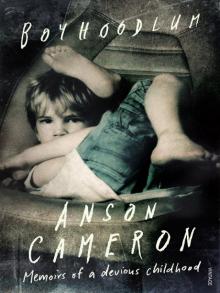 Boyhoodlum
Boyhoodlum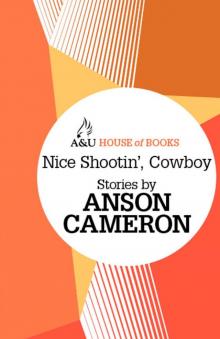 Nice Shootin' Cowboy
Nice Shootin' Cowboy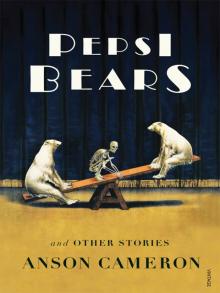 Pepsi Bears and Other Stories
Pepsi Bears and Other Stories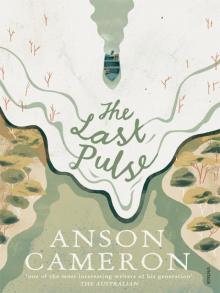 The Last Pulse
The Last Pulse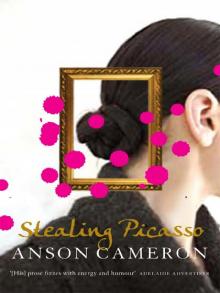 Stealing Picasso
Stealing Picasso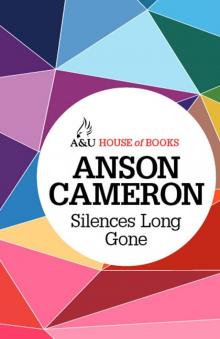 Silences Long Gone
Silences Long Gone